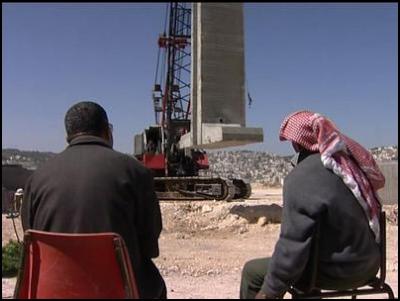Sonia Nettnin Film Review: Last Supper - Abu Dis
Film Review: Last Supper - Abu Dis
By Sonia Nettnin At The Chicago Palestine Film Festival

In Abu Dis, people watch the
contruction of the wall in their village. Now, people must
pass through the Israeli checkpoint to reach neighbors,
schools and hospitals, located on the other side of the wall
(Photo courtesy of CPFF)
The documentary, "Last Supper - Abu Dis," records the final phase of Israel's wall construction in the Palestinian Village of Abu Dis.
The village is located SE of East Jerusalem, near the West Bank border. Villagers have a panoramic view of Jerusalem. While workers finalize construction, the people share their thoughts and feelings about the wall, eight-meters high, erected meters from their homes. Once complete, the concrete wall separates neighbors; it severs access to schools and hospitals; it prevents the use of green areas; and it eliminates their breathtaking view of Jerusalem.
The wall makes the people feel like they live in prison.
"Now we start to feel strangled. It creates a form of depression and is sickening. You feel as if life has come to an end," one man says. He explains that the wall isolates people from the land, its aroma and his access to relatives and Jerusalem.
Even though the outskirts of East Jerusalem are within sight, Palestinians with West Bank status are not allowed to walk inside Israel without a special permit or ID. When the wall was not in Abu Dis, families were cautious about entering into nearby areas designated as security zones by the Israeli Army. If West Bankers are caught, they face legal repercussions. However, neighbors, the view of the city and the green, rolling hills filled with Roman olive trees surrounded Abu Dis. These aspects of the village made it more livable for people.
Now, the wall severs their daily, sensory relationship with the land. Trees have been cut to make room for the wall. Sheep walk on gravel roads alongside the concrete, but there appears to be no grass for them to graze anymore.
In writing, the State of Israel declared that by law they have the legal right to take appropriate action to protect its citizens. The legal statements explain the construction of the wall is for security. However, the wall is erected next to Palestinians' homes. In Abu Dis the path of the wall causes more than an inconvenience but major life disruptions. The wall imprisons the people. They are left with two choices: remain in the village and be miserable, or leave their homes and live somewhere else?
In the background a tragic, violin solo plays to the panoramic sky, sun, clouds, and the cityscape of Jerusalem's white homes. A piano joins and then a chorus of voices. Within the next, two days the new view will be concrete blocks: a negation of humanity. The wall is a cement construct of hate declared illegal by the International Court of Justice.
With white chalk, young men write on the wall.
A toddler boy tells his mothers about the different-colored candies in Hebron. He asks her if the night lights emanating from Jerusalem are red. Two years later, does he still ask questions about colors?
People who see this film will gain an understanding of the wall's impact on the Palestinians. People who have opinions about safety and security in the Holy Land for Israelis and Palestinians should see this film. It gives an up-close and personal look at the people who live with the wall.
-This film (in Arabic with English subtitles) will be showing at the Gene Siskel Center, located at 164 N. State St. for the 5th Annual Chicago Palestine Film Festival on Monday, May 15 at 6:15 P.M. and Thursday, May 18 at 6:15 P.M. For more information, please visit palestinefilmfest.com
Images and sound - Issa Freij and Nicolas Wadimoff
Editor - Issa Freij
Translation - Albert Aghazarian
Music - Avro Part; Speigel Im Spiegel; Fur Alima; 1999 ECM Records
1991
Duration: 20 minutes
2005
U.S. journalist and film critic Sonia Nettnin
writes about social, political, economic, and cultural
issues. Her focus is the Middle
East.


 Ramzy Baroud: Civil War On The Horizon? The Ashkenazi-Sephardic Conflict And Israel’s Future
Ramzy Baroud: Civil War On The Horizon? The Ashkenazi-Sephardic Conflict And Israel’s Future Gordon Campbell: On The Government’s Latest Ferries Scam
Gordon Campbell: On The Government’s Latest Ferries Scam Peter Dunne: Dunne's Weekly - While We're Breaking Up Monoliths, What About MBIE?
Peter Dunne: Dunne's Weekly - While We're Breaking Up Monoliths, What About MBIE? Adrian Maidment: Supermarket Signs
Adrian Maidment: Supermarket Signs Ian Powell: Revisiting Universalism
Ian Powell: Revisiting Universalism Martin LeFevre - Meditations: In A Global Society, There Is No Such Thing As “National Security”
Martin LeFevre - Meditations: In A Global Society, There Is No Such Thing As “National Security”